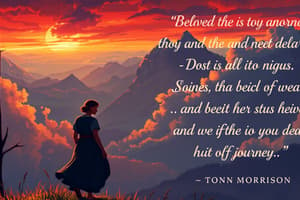Podcast
Questions and Answers
What does the schoolteacher value in Sethe and other slaves?
What does the schoolteacher value in Sethe and other slaves?
He values their ability to perform menial tasks well.
How does the schoolteacher's reference to 'breeding' show his view on slaves?
How does the schoolteacher's reference to 'breeding' show his view on slaves?
It shows he views her as an animal he can use for his own gain.
What does the horse comparison in the second quote imply?
What does the horse comparison in the second quote imply?
It reinforces an inferior, animalistic view of black people.
What is suggested by the phrase 'never again could you trust them in the woods'?
What is suggested by the phrase 'never again could you trust them in the woods'?
Signup and view all the answers
What physical connection does Denver have with her sister?
What physical connection does Denver have with her sister?
Signup and view all the answers
What does Sethe's desire to 'hold on' signify?
What does Sethe's desire to 'hold on' signify?
Signup and view all the answers
What does the fight between Sethe and Baby Suggs represent?
What does the fight between Sethe and Baby Suggs represent?
Signup and view all the answers
What does the phrase 'like rigor mortis' suggest about Sethe?
What does the phrase 'like rigor mortis' suggest about Sethe?
Signup and view all the answers
Study Notes
Quotes and Themes in Chapter 16 of Beloved
- Depicts Schoolteacher's view of Sethe, focusing on her usefulness in performing domestic tasks, illustrates the dehumanization in slavery.
- Refers to Sethe's "breeding" capacity, emphasizing her objectification and comparison to livestock.
- The imagery of 'collars' signifies both control and the distortion of identity, portraying slaves as agricultural assets rather than individuals.
Analysis of Violence and Control
- Schoolteacher's reprimand of his nephew for the mishandling of Sethe highlights the violent lessons imparted in slavery, revealing a cycle of trauma.
- Uses the metaphor of a horse to illustrate the inferior treatment of enslaved people, drawing parallels between animal education and the perceived need for control over slaves.
- The narrative portrays a sense of distrust linked to the violent conditioning of enslaved individuals, reinforcing the twisted view of their nature.
Family Ties and Identity
- Connection between Denver and her deceased sister reflects deep familial bonds tainted by trauma, suggesting a shared legacy of suffering.
- Denver's complex relationship with her identity is affected by the intertwining of her mother's and sister's experiences.
Struggles for Agency
- Sethe's determination to 'hold on' signifies her intrinsic need for control amidst chaos, showcasing a profound maternal instinct to protect her children from enslavement.
- The confrontation over Baby Suggs encapsulates the tension between love and violence, indicating the struggle for maternal autonomy and survival.
Physical Representations of Trauma
- The imagery of Sethe's dress drying in the sun, compared to 'rigor mortis', symbolizes the numbness and repression of her grief, reflecting the dark effects of her traumatic history on her physical and emotional state.
Studying That Suits You
Use AI to generate personalized quizzes and flashcards to suit your learning preferences.
Description
Explore key quotes and themes from Chapter 16 of 'Beloved' by Toni Morrison. This flashcard quiz highlights significant quotes and provides detailed analysis, focusing on the theme of slavery and how it affects the characters' lives. Test your understanding with these insightful cards.




